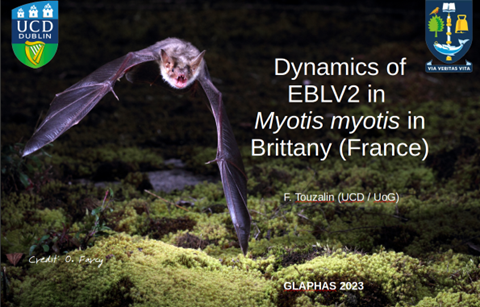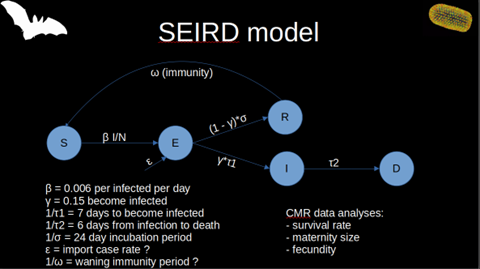Insight in rabies in European bats
By Ana Stefanovska
Posted: 24 April, 2024

Rabies is a serious viral disease found in over 150 countries around the world. Up to 50,000 people die from it each year, especially in Asia and Africa and, surprisingly, 40% of these victims are kids under 15 years old. Dogs are the main source of human rabies deaths being responsible for almost all cases through biting. Rabies will lead to death in 100% of cases when the clinical symptoms appear, however, this can be stopped by vaccinating dogs and preventing them from biting people. Post exposure treatment can also be applied if someone gets bitten by an animal that might have rabies. This special treatment called post-exposure prophylaxis (PEP), involves cleaning the wound really well with soap, administering the rabies vaccination and a serum injection depending on the country. The estimated cost of rabies across the world is approximately US$ 8.6 billion each year. Western Europe eradicated rabies from dogs and foxes decades ago, but there are regularly imported cases. Bats carry specific rabies viruses with new strains recently discovered, but with very rare transmissions cases to other mammals.
A “One Health” approach means getting everyone involved, including different groups and communities, to raise awareness and vaccinate animals and humans. The GALPHAS 2023 collaborative meeting for rabies researchers, which took place in October 2023 between the University of Glasgow and the University of Surrey, gathered researchers and governmental agencies to share discoveries and promote collaboration for prevention of rabies around the world. Dr Frédéric Touzalin presented a talk titled Dynamics of EBLV2 in Myotis from Brittany (France) to introduce the research community to his MSCA DOROTHY research project on preventing and mitigating the spread of zoonotic diseases and drug resistance. Although the European bat 2 lyssavirus (EBLV-2), a bat Lyssavirus found in Daubenton’s bats (Myotis daubentonii) in Great Britain, is not officially present in France, blood samples, taken randomly between 2010 and 2018 in M. myotis bat populations in Brittany, revealed seropositive individuals. Several relatively synchronous peaks in prevalence in 4 studied populations suggest waves of contamination. In this presentation, Frédéric outlined the mechanisms behind the observed patterns of disease resurgence, by using epidemiological models.

In Frédéric’s words: Presenting my research findings at the GALPHAS 2023 conference allowed me to showcase my work to a diverse audience of peers, experts, and professionals. This exposure can lead to greater recognition of my research within the scientific community and the governmental agencies. The exchange of knowledge through presentations and panel discussions facilitates the dissemination of new ideas, methodologies and innovative approaches to tackling the challenges of rabies. Alongside the numerous networking opportunities to connect with other fellow researchers, professors and practitioners who share similar interests or are working on related topics, these connections also provide constructive feedback, and lead to collaborations, future research opportunities, and even career advancement. Overall, participating in this meeting on rabies gave me the valuable possibility to engage with the global scientific community.
Frédéric will be presenting the development of his project and the most recent outcomes of his research at the 16th European Bat research Symposium (EBRS-2024) which will be held in Tarragona, Spain, from 2-6 September 2024.